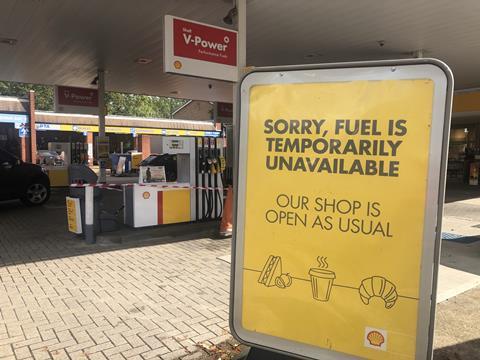Government proposals to ensure resilience in the supply of oil based fuels have come under scrutiny.

Just weeks after ministers and their civil servants appeared powerless to prevent the worst fuel crisis since the fuel price protests of 2000, with many petrol stations running dry, a committee of MPs has given their verdict on government proposals to ensure resilience in the supply chain.
The timing, however, was a coincidence as the draft Downstream Oil Resilience Bill was published in June, long before this latest crisis, and is based on a programme of work dating back as far as 2017. And rather than being prompted by fears of a shortage of tanker drivers or the ability of motorists to drain the system dry through panic buying, the Department for Business, Energy & Industrial Strategy (BEIS) says the bill is needed due to concerns that the industry, and UK supply lines, could face serious disruption as the economy moves away from fossil fuels.
The cross-party BEIS Committee of MPs took the evidence for their report before the latest fuel crisis, so its findings contained only a fleeting reference to the events of late September.
Their report was broadly supportive of the government’s bill and its intention to protect fuel supplies, but warned that its powers are “unusually and unacceptably broad”.
The government’s intention for the draft bill is to empower ministers to pre-emptively give directions to the downstream oil industry – meaning the import, supply, storage, distribution and/or retail of petroleum products – as a means of preventing disruption to the UK’s fuel supply chains.
The BEIS Committee’s report explained that the committee – made up of six Conservative, four Labour and one SNP MP – was sympathetic to the government’s arguments that such a bill was needed, and that existing legislation lacks scope for ministers to intervene pre-emptively to prevent an emergency before one starts to unfold.
However, the committee was concerned at the breadth of some of the proposed powers and recommended that the bill should be revised to narrow its scope.
Darren Jones MP, chair of BEIS Committee, said: “While the government is rightly concerned with reaching its target of net zero emissions by 2050, petrol products are likely to remain a vital part of the country’s energy supply as the transition to greener energy takes place over the years ahead.
“However, in our report we urge the government to heed the warnings expressed by the expert witnesses who gave evidence during our inquiry. The bill should be revised to include more detail about why, when and how these new powers would be used to ensure the legislation achieves what it sets out to do to ensure resilience in the downstream oil supply chain.”
The new powers contained in the bill cover four main areas:
Direction Power – where the BEIS secretary could issue companies with directions, for example, to send fuel supplies to areas or industries where they are most needed;
Information Power – to require companies to provide officials with financial information if there are concerns that a company is facing insolvency and that this could disrupt petroleum supply chains;
Spending Power – to enable ministers to provide direct financial assistance to companies, for example, to help them comply with a direction;
Control Test Power – to ensure that any person or company taking control of critical infrastructure in the sector will have appropriate financial and operational measures in place to prevent unsuitable investment prejudicing UK fuel supply resilience.
The committee’s report recommended that the government’s intentions for the bill should be clearly explained. It also argued that despite the government’s assurance that these powers would be used as a “backstop”, or “last resort”, the draft bill “includes no such qualification” on its face.
The committee said the draft bill is “unusually and unacceptably broad” and contains too much “vagueness” .
Clarification
The committee’s report echoed calls from ACS in its submission to the inquiry in July, to clarify the requirements on downstream oil operators to report incidents. The ACS submission also called on the government to review its national emergency plan for fuel to avoid future fuel disruption and increase security in the supply chain.
ACS chief executive James Lowman said: “We welcome the committee’s recommendations which will create a stronger framework for fuel resilience in future, which we hope will mean that petrol retailers, who are incredibly important to their communities, will be able to get on with serving their customers and not dealing with supply chain issues.”
Oil companies also took issue with some of the provisions in the draft bill. In its evidence to the inquiry their trade association UKPIA stated:
The powers in the bill are in some cases too broad and, at worst, have the potential to negatively influence industry decisions to invest in the UK – this applies both to investments to maintain supplies today, but may also influence decisions for decarbonisation-related investment.
The bill, as drafted, is too broad in nature for the industry to fully understand its implications for their operations. While BEIS plans to run workshops on the Bill and has indicated secondary legislation will be issued – this limits the ability to fully assess the implications of the bill at this time.
The sector relies on fair and strong competition, which has for decades supported the efficient delivery of affordable fuels and a market that is able to mitigate the majority of resilience issues.
There appears to be crossover and duplication with existing legislation (such as the Energy Act 1976) that either needs to be clarified in terms of which powers would be used when or, as with the control powers, offers the opportunity for streamlining of the requirements on businesses.
Getting the bill to this draft stage has taken a long time and businesses in the downstream sector welcome the government’s concern over the resilience of supplies to forecourts, even if its handling of the September crisis was less than reassuring. However, there are clearly issues in the bill that still need to be ironed out, and it may require time yet before a bill that is fully fit for purpose is ready to proceed.

































No comments yet